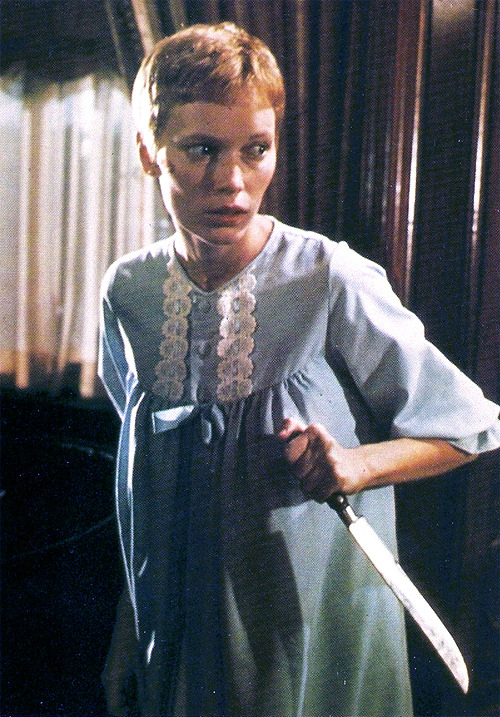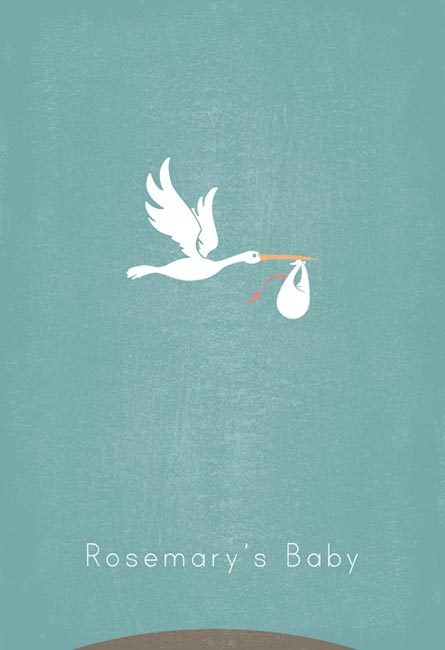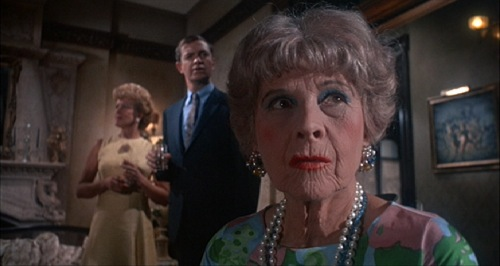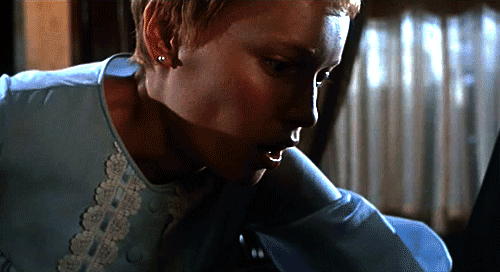So having finished reading
Rosemary's Baby and having never seen the film, I thought I could do a cool 'novel versus film: fight to the death' type review. However upon viewing the movie, my grand thoughts of a paperback and big screen showdown was thoroughly dashed as the film is one of the single most faithful adaptations to the original source I think I've ever seen. So this will probably just play out as any regular review, boo hiss.
 |
| I'm getting such strong E.T vibes. |
A young couple move into a new apartment, only to be surrounded by peculiar neighbors and occurrences. When the wife becomes mysteriously pregnant, paranoia over the safety of her unborn child begins controlling her life.
 |
Everyone in the film hated her haircut but
she is lookin' fierce as hell. |
I'm not going to pretend to be hugely knowledgeable about the horror genre as it's probably the type of film I'm least familiar with since I'm a scaredy-cat and don't watch horror films particularly often, However I did really enjoy
Rosemary's Baby, despite the fact that is featured a theme that normally gets to me too much: pregnant women in danger. Pregnant women should be left alone and/or protected at all costs. I read on
IMDb that the reason for the film being so gosh-darn faithful to the book is that director Roman Polanski didn't realise that he could deviate from the original material since it was his first time adapting another writers work. The credibility of this is probably debatable though, but it does make for a nice reason. Another reason might simply be that Ira Levin's novel was so good in the first place that it didn't need to be changed, something which I actually could believe.
Everything in the film plays out in, more or less, the same way and same order as it does in the book. Having written a however-many-thousand word essay on adaptation earlier this year for university, one might think I would have some more eloquent and intelligent thoughts about the way the film handled adapting the novel, throwing in words like fidelity (which in this case is absolutely rock solid) or discussing how fidelity only really makes sense as a criterion of value if we can be certain that the model is more valuable than the copy, which would throw us into a great debate of film versus books in general and not just limited to
Rosemary's Baby. It is really a discussion in itself and,
spoiler alert,
I think it's a stupid debate because both forms have their own artistic merits and I don't think one is inherently better than the other. And that children is what we call a tangent. Getting back to the subject at hand!
Buzzfeed put together an article that examines how the most disturbing parts of
Rosemary's Baby aren't the supernatural parts, something that I'm inclined to agree with.
 |
| Minimalist posters are my jam, yo. |
The article talks about various aspects of the film, but the one that really creeps me out is the way that Rosemary (played by Mia Farrow) gets treated by her husband Guy. A man who she loves and is supposedly loved by treating her in such a subtly (and sometimes not so subtly) disgusting way without her realising is enough to make my skin crawl. I feel like both and book and the film definitely got this on the head and the casting for the film is pretty excellent. John Castavetes, who portrays Guy, manages to get down all of Guys key characteristics; he is charming, he is funny, he has a face that permanently looks apologetic and a little naive throughout the film. This works for him because when it comes time for him to shout at Rosemary, to guilt her into doing something or even making a casual joke about raping his wife's sleeping body, he makes this wide-eyed face at her that makes her feel like she was in the wrong and he is right. That's pretty damn scary. Another thing is the complete and utter isolation that Rosemary is subjected to when she becomes pregnant; she is always surrounded by the same people who are scheming against her, she is advised by her doctor not to listen to her friends stories of pregnancy or to read books and is scolded by him when she disobeys, a close friend of hers is taken away from her and it's only when she throws a party for her old friends that aren't wrapped up in this nonsense that her fears are finally confirmed. The thought that a person's knowledge of the outside world and their way of thinking can be manipulated and limited so easily is pretty unsettling.
The supernatural elements of the film are fairly limited, meaning that it does act more of a psychological horror than that of a supernatural thriller. However, when the supernatural elements do get brought out, it is usually in the form of a really trippy dream sequence; something, again, which both and film and the book pull off rather well. In this instance, I do think that the film perhaps does it a bit better because there was more of a definite line between what was dream and what was reality; when I was reading the book I did get a little confused as the dream sequences sometimes came out of nowhere and I was a somewhat confuddled. I guess it would act as a form of representing how the supernatural elements of her dreams were blurring with her real life, which in theory sounds good, but in practise I felt possibly could have been executed a bit better. This is just me nit-picking though, all in all I really did thoroughly enjoy the book.
 |
| My make-up icon for life. |
Like I said earlier, the casting for this film is pretty perfect and I couldn't finish this post without talking about the formidable Minnie Castevet who is played by Broadway star and the current holder of the "
greatest romantic movie character ever" award,
Ruth Gordon. She encapsulates the nosey, fussy, no-filter neighbour. She tears into the house with such self-assured authority that no-one even questions her presence. You know what they say: you can get away with just about anything if you act confident. She and her husband Roman (Sidney Blackmer) infiltrate the Woodhouse's lives so effortlessly that it's easy to see how Guy and Rosemary would get wrapped up in their lives.
 |
| "Tatiana Maslany wasn't nominated for an Emmy?!" |
To wrap things up,
Rosemary's Baby is a great film and equally great book. The fact that film followed the book so closely was cool to see, although if I'm going to be nit-picky again, the ending of the film was eeeeeever-so-slightly different than the book and I was hoping it would be the same because there was something about the way the book ends that was really unnerving which the film doesn't capture in the same way. But that's all. Nit-picking over. Till next week!





No comments:
Post a Comment